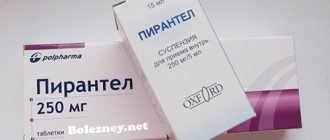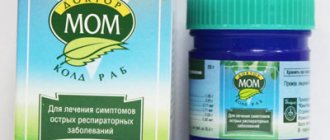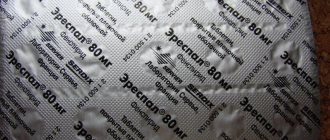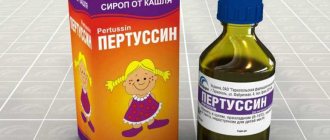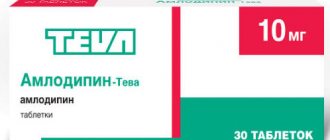Erius is an anti-allergy medication of the latest (third) generation with a prolonged effect. The original medicine is one of the safest antihistamines; it blocks the release of free histamine.
When taking Erius, in rare cases, negative phenomena appear; the medication is not characterized by sedation, therefore, due to use, the allergic person does not notice a tendency to sleep. We will learn more about the properties, dosage forms and generics, indications, contraindications, and costs from the article.
Pharmacological properties
Pharmacodynamics
Long-acting antihistamine. It is the primary active metabolite of loratadine. Inhibits the cascade of allergic inflammation reactions, including the release of proinflammatory cytokines, including interleukins IL-4, IL-6, IL-8, IL-13, the release of proinflammatory chemokines (RANTES), the production of superoxide anions by activated polymorphonuclear neutrophils, adhesion and chemotaxis of eosinophils , release of adhesion molecules such as P-selectin, IgE-mediated release of histamine, prostaglandin D2 and leukotriene C4. Thus, it prevents the development and facilitates the course of allergic reactions, has antipruritic and antiexudative effects, reduces capillary permeability, and prevents the development of tissue edema and smooth muscle spasm.
The drug has no effect on the central nervous system, has virtually no sedative effect (does not cause drowsiness) and does not affect the speed of psychomotor reactions. Does not cause prolongation of the QT interval on the ECG. The effect of the drug Erius® begins within 30 minutes after ingestion and continues for 24 hours.
Pharmacokinetics
Desloratadine is well absorbed from the gastrointestinal tract. Determined in blood plasma 30 minutes after oral administration. The maximum concentration is reached on average 3 hours after administration. Does not penetrate the blood-brain barrier. The binding to plasma proteins is 83-87%. When used in adults and adolescents for 14 days at a dose of 5 mg to 20 mg once a day, no clinically significant accumulation of the drug is observed. Concomitant ingestion of food or grapefruit juice does not affect the distribution of desloratadine when used at a dose of 7.5 mg once daily .
Desloratadine is not an inhibitor of CYP3A4 or CYP2D6 and is not a substrate or inhibitor of P-gp. Intensively metabolized in the liver by hydroxylation to form 3-OH-desloratadine combined with a glucuronide. Only a small portion of the oral dose is excreted by the kidneys (<2%) and intestines (<7%). The half-life is 20-30 hours (average 27 hours).
Composition, dosage forms, manufacturer
The patented medicine is produced by the Belgian pharmaceutical company Schering-Plough Labo NV and is sold in pharmacies in two dosage forms:
- Pills;
- Syrup.
The main pharmaceutical substance is desloratadine, a processing product of loratadine. One Erius tablet contains 5 mg of the substance, and 1 ml of suspension contains 0.5 mg. Distinctive features of dosage forms are visible in the table:
| Pills | Syrup | |
| Description | • Covered with a thin film shell; • With a blue tint; • Convex round shape; • With one-sided engraving SP (Schering-Plough); • No characteristic odor. | • Transparent texture; • Orange suspension; • No characteristic odor. |
| Additional components | • MCC; • Calcium hydroorthophosphate; • Corn starch; • Talc. | • Sorbitol; • Propylene glycol solution; • Citric acid anhydride; • Sodium benzoate; • Disodium salt; • Flavor No. 15864; • Sucrose; • Dye; • Distilled water. |
| Package | Produced in blister packs of 7 or 10 tablets. The blisters are placed in branded cardboard packaging. | Dark glass bottles with a measuring spoon of 2.5 ml. In pharmacies you can purchase a suspension in dosages of 60 and 120 ml. |
The choice of dosage form - tablets or syrup - is made taking into account the individual characteristics of the patient. When prescribing a medicine, the doctor is guided by the patient’s age, the presence/absence of underlying diseases, body weight, and individual hypersensitivity.
Overdose
Symptoms.
Taking a dose 5 times higher than the recommended dose did not lead to the appearance of any symptoms. In clinical trials, daily use of desloratadine up to 20 mg for 14 days in adults and adolescents was not associated with statistically or clinically significant changes in the cardiovascular system. In a clinical pharmacological study, the use of desloratadine at a dose of 45 mg per day (9 times higher than recommended) for 10 days did not cause prolongation of the QT interval and was not accompanied by serious side effects.
Treatment.
If you accidentally ingest a large amount of the drug, you should immediately consult a doctor. Gastric lavage and activated charcoal are recommended; if necessary, symptomatic therapy. Desloratadine is not eliminated by hemodialysis; the effectiveness of peritoneal dialysis has not been established.
Indications for use
A direct indication for the use of Erius is allergies in the form of:
- Rhinoconjunctivitis with rhinorrhea, nasal congestion, sneezing attacks, lacrimation, photophobia, inflammation of the ocular connective membrane, conjunctival hyperemia, itchy sensations on the mucous membranes;
- Hay fever (hay fever) is a seasonal allergy to pollen from highly allergenic plants;
- Nettle rash with epidermal itching.
In addition to allergies, the medication is often prescribed to eliminate the symptoms of dermatoses and dermatitis of various etiologies:
- Neurodermatitis;
- Negative effects of ultraviolet rays (sun);
- Cold allergy;
- Individual food intolerance;
- Contact and atopic dermatitis;
- Dermatitis herpetiformis.
The antiallergic medicine does not treat infections, but relieves inflammation and has an antipruritic effect, so sometimes experts prescribe Erius as symptomatic therapy for the following infectious diseases:
- Acute tonsillitis;
- Chicken pox;
- Roseola exfoliates (Giber's lichen);
- Scabies;
- Psovdosarcoptosis (pseudoscabies);
- Scabious lymphopathy;
- Varicose eczema;
- Laryngitis;
- Adenoids;
- Hearing loss 2 degrees.
Acute tonsillitis
Chicken pox
Ringworm Zhibera
Scabies
Psaudosarcoptosis
Varicose eczema
Laryngitis
Adenoids
Sometimes Erius is prescribed to prepare the patient for routine vaccinations (Mantoux, DPT, MMR, HPV and others), but self-medication is prohibited - before taking an antiallergic drug, it is important to consult a specialist.
Analogs
Erius has absolute and relative analogues. Absolute generics are drugs with the same main pharmaceutical substance:
- Alercis;
- Trexyl-Neo;
- Loratadin-Stada;
- Loradek;
- Fribreeze;
- Eridez;
- Allergostop;
- Allergonorm;
- Allergomax;
- Eridez-Darnitsa;
- Desloratadine-LF;
- Desloratadine Canon;
- Nalorius;
- Blogir-3;
- Eslotin;
- Eliseus.
Medicines with similar effects are cheaper than the patented medicine.
Erius and absolute generic drugs can be replaced with drugs with the active ingredient - loratadine, since the latter is a metabolite of desloratadine.
Relative analogues are medicines with other main active ingredients:
- Cetrin - with another chemical substance cetirizine;
- Suprastin - with chloropyramine;
- Kestin - with ebastine;
- Telfast - with fexofenadine.
Tsetrin
Suprastin
Kestin
Telfast
The prices of medicinal synonyms fluctuate - there are drugs more expensive and cheaper than Erius. The cost of medicinal products is determined by the volume, number of tablets, and country of origin. In case of hypersensitivity to desloratadine, you can choose another generic that differs in the active substance. So, Erius syrup can be easily replaced with Zyrtec and Zodak drops.
Erius - price
The price of the drug in tablets is 1 package of 10 pcs. 0.005 g per:
- Russia – 570 rubles;
- Ukraine – 250 UAH;
- Belarus – 20 rubles;
- Kazakhstan – 3290 Tg.
A 60 ml bottle of Erius syrup in the pharmacy chain is sold at the following prices in:
- Russia – 400 rubles;
- Ukraine – 185 UAH;
- Belarus – 14.5 rubles;
- Kazakhstan – 1440 Tg.
https://youtu.be/-nfjvJ1X410
Summarizing
Erius are effective tablets for eliminating allergic symptoms. There are a large number of positive opinions regarding this medicine on the Internet.
Article on the topic: Top effective antihistamines of the new generation
Doctors prefer Erius because the medicine quickly acts on H1-histamine receptors, and the result lasts for more than a day. Moreover, the instructions state that the medication is well tolerated and there are few negative consequences due to the use of Erius.
Dermatologists and allergists not only advocate the use of Erius in the case of relief of allergic symptoms, but also advise taking the drug to prevent an immune response to an irritant.
Treatment of urticaria (urticaria)
Urticaria, nettle rash, or urticaria can occur as a result of various irritants; these can be food, medicines, chemicals. The most common causes of hives are fish, eggs, certain types of meat and chocolate. Salvation is only in diet, but at the same time the body needs support, and Erius is a good choice.
Hives can be acute or chronic. Each attack of urticaria is a test and stress on the immune system. If these attacks are too frequent, the problem seriously threatens your health.
The main mistakes of pregnant women
Despite the fact that medical statistics are sounding the alarm about the annual increase in the number of people suffering from allergies, potential patients of allergists themselves behave surprisingly calmly. Some of them do not consider allergies to be a serious disease (and this despite the fact that it is increasingly manifested by life-threatening angioedema), another part prefers independent treatment, and some do nothing at all - they wait for the allergy to disappear by itself.
The main mistake of half of them is the reluctance to see a doctor again; they believe that scheduled visits to the antenatal clinic are quite enough for a full examination.
Another mistake is treatment with the usual “pre-pregnancy” methods and drugs.
The third mistake is using new, unfamiliar medications on the advice of third parties.
In all three cases, there is reason to fear neglect of the disease or illiterate therapeutic intervention. Both one and the second can lead to negative consequences for the health of the mother and baby.
Since in-depth laboratory studies of the effect of the active substance of the drug on the fetus have not been carried out, the use of Erius for pregnant patients is not recommended.
At one time, the doctor forbade me from Paracetamol... From the medications in the travel first aid kit, I took Enterosgel, Gaviscon (for heartburn), Aqualor.
Consequences of drinking alcohol
Doctors did not identify the consequences of mixing alcoholic beverages and medicine, however, there are several reviews on the Internet indicating poor compatibility of the substances.
Concomitant use of alcohol and an antihistamine may result in a disulfiram-like reaction. The medicine, reacting with ethanol, contributes to intoxication of the body.
Patients may react to this in different ways; with a weakened immune system, nausea, vomiting, unbearable pain in the head, fever and hyperemia may appear. There are frequent cases of diagnosing unusual tachycardia, convulsions and chest pain.
Doctors' opinions about the drug
Reviews from experts about the drug Erius:
The medicine is very effective. In all my practice, I have never received any complaints about the medicine. I try to prescribe it to my patients, as there are no side effects. The antihistamine does not conflict with most known drugs.
Igor Alekseev, allergist
Erius has all quality certificates, its effectiveness has been scientifically proven. I use them myself and recommend them to patients. It can be used at any stage of allergy; you only need to take the tablets once a day.
Kristina Antonova, ENT doctor
The medicine has proven itself well. Great for teenagers, does not affect the central nervous system. Patients do not experience excitement or, conversely, apathy, and there is no drowsiness.
Evgenia Konovalova, pediatrician
I am a young specialist, but during my work as an allergist I experienced all the benefits of Eriust. I took it myself for allergic rhinitis. She noted that the runny nose, characteristic of the disease, goes away after three days. Itching in the nasal cavity ceases to bother you after 2 days.
Marianna Gray, allergist
Side effects
If the dosage is violated, as well as if the drug is used incorrectly, negative manifestations may develop, expressed by the following symptoms:
- the appearance of a nagging headache;
- increased fatigue, discomfort;
- the appearance of tachycardia, elevated temperature, etc.
In addition, all manifestations of allergies may be observed, manifested by a hyperemic rash, swelling, itching, and in some cases, shock.
Reviews
Erius is an antiallergic drug of the latest generation, which patients and doctors give mostly positive ratings. Doctors note the rapid and long-lasting effect of the substance. In addition, doctors substantiate that the medication has excellent tolerability and in rare cases is characterized by negative reactions. Often the drug is prescribed not only for the treatment of allergic symptoms, but also to prevent possible signs of immune responses.
The medicine is often prescribed to children because of its ease of use and quick effect. The drug effectively fights hay fever, which is especially important in recent years.
Marina, 26 years old “Lately, in the spring and summer, I have been suffering from allergy symptoms. Typically, doctors prescribed medications that had a noticeable sedative effect—they made you sleepy and decreased performance. One day, having forgotten to take the prescribed medicine from home, I ran into the pharmacy, where Erius was recommended. Taking pills doesn’t cloud my life—I can even drive a car, since I haven’t noticed any slowdown in my reaction.”
Lyudmila, 21 years old “Erius has been in my purse for more than six months. One day my husband and I went to the village and he developed an allergy. The nearest pharmacy recommended this medicine. The symptoms were relieved, we were satisfied.”
Contraindications
Erius in tablet form is approved for treatment of patients from 12 years of age, and syrup can be prescribed to infants from 6 months. Antihistamines should not be taken by nursing mothers (desloratadine passes into breast milk) or by pregnant women.
Also, the medication is not recommended for treatment for people with hypersensitivity to the main or additional components, patients with glucose-galactose malabsorption, sucrose and isomaltose deficiency. For renal and hepatic dysfunctions, Erius is prescribed with caution, and the dose is adjusted downwards.
Special cases
Erius syrup and tablets may cause side effects. During treatment, people experienced increased fatigue, headaches and dizziness. The medicine affects the gastrointestinal tract and may cause nausea, vomiting, diarrhea and dry mouth. Cases of tachycardia and increased heart rate have been recorded. Possible increase in body temperature.
If you are intolerant to the drug, allergic reactions occur, such as:
- Anaphylaxis,
- Itching,
- Hives,
- Angioedema.
The instructions for use of Erius indicate that some people who bought the product developed insomnia. However, no serious symptoms were identified in case of drug overdose. Eating does not affect the effectiveness of the medication. During treatment with Erius, it is allowed to drive vehicles and operate complex machinery, as long as the prescribed dosage is not exceeded.
Before buying syrup for children, you must consult a doctor for a thorough diagnosis of the child’s condition. At the age of less than two years, rhinitis most often occurs due to infections. In this case, Erius syrup will not be able to improve the baby’s condition.
During diagnosis, special attention must be paid to the presence of structural abnormalities or foci of infection in the upper respiratory tract
When prescribing Erius syrup for children, a thorough diagnosis of the child’s condition is necessary.
What to replace the medicine with?
Erius has a large number of analogues and generics (medicines that are sold under an international non-proprietary name). Often the second group of drugs costs much less than the original. Generics are similar to the original in the active substance. Analogs may differ in composition. Antihistamines have various forms of release: drops, syrup, tablets, dragees, injection solution. The table provides information on analogue drugs of Erius.
| Name of the drug | Manufacturer country | Release form | Active substance | Age restrictions | Contraindications |
| Desloratadine | Israel | Pills | Desloratadine | ≥ 2 years | Phenylketonuria, hypersensitivity to the active substance. |
| Desal | Iceland | Tablets, oral solution | Desloratadine | ≥ 1 year – for solution, ≥ 12 years – for tablets | Hypersensitivity to the components of the drug, fructose intolerance, impaired absorption of glucose and galactose, deficiency of sucrase and isomaltase. A relative contraindication is severe liver failure. |
| Lordestin | Hungary | Tablets, syrup | Desloratadine | ≥ 1 year | Sensitivity to the components of the drug, intolerance or malabsorption of sorbitol, sorbitol dehydrogenase deficiency. A relative contraindication is severe renal failure. |
| Elisea | Ukraine | Pills | Desloratadine | ≥ 2 years | Phenylketonuria, hypersensitivity to the active substance. |
| Diazolin | Russia | Dragees, tablets | Mebhydrolin | None | Prostate hypertrophy, angle-closure glaucoma, gastric and duodenal ulcers, exacerbation of inflammatory processes in the digestive organs, hypersensitivity to the components of the drug, pyloric stenosis, epilepsy, heart rhythm disturbances. |
| Suprastin (more details in the article: dosage of the drug "Suprastin" for children under one year old) | Hungary | Tablets, solution for intravenous and intramuscular injections | Chloropyramine hydrochloride | ≥ 1 month – for solution, ≥ 3 years – for tablets | Exacerbation of bronchial asthma, lactase deficiency, lactose intolerance, glucose-galactose malabsorption syndrome (for tablets), sensitivity to drug components. Relative contraindications: angle-closure glaucoma, urinary retention, prostate hyperplasia, renal liver dysfunction, cardiovascular diseases. |
| Zyrtec | Switzerland | Tablets, drops for oral use | Cetirizine dihydrochloride | ≥ 6 months – for drops, ≥ 6 years – for tablets | End-stage renal failure, hereditary galactose intolerance, lactase deficiency or glucose-galactose malabsorption syndrome, sensitivity to the components of the drug. Relative contraindications: chronic renal and liver failure. |
| Claritin | Belgium | Tablets, syrup | Loratadine | ≥ 2 years – for syrup, ≥3 years – for tablets | Galactose intolerance; deficiency of lactase, malabsorption of glucose-galactose, sucrase, isomaltase; fructose intolerance; glucose-galactose malabsorption; sensitivity to the components of the drug. A relative contraindication is severe liver pathologies. |
| Ketotifen | Russia | Tablets, syrup | Ketotifen | ≥ 6 months | Hypersensitivity to the active substance. |
| Diphenhydramine | Republic of Belarus | Tablets, solution for intramuscular and intravenous injections | Diphenhydramine | None | Angle-closure glaucoma, prostatic hypertrophy, stenosing gastric and duodenal ulcers, bladder neck stenosis, asthma, epilepsy, sensitivity to drug components. |
Loading...
Share with friends!
For itching
Skin irritation - itching and redness, as well as itching in the eyes, nose, and palate - are elements of the symptoms of allergic attacks. Erius also successfully affects unpleasant itching from an allergic irritant.
Among the most painful types of skin itching is urticaria: the itching is accompanied by characteristic rashes, when, when scratching, a secondary bacterial infection of the skin and subcutaneous tissues can decompose and develop. Timely administration of Erius prevents such events. In addition, with the help of the medication, unpleasant conditions around chronic skin irritation on an allergic basis are alleviated.
List of syrups used in pediatric practice to treat allergies
Most liquid forms of allergy medications have complete analogues among solid drugs.
The difference lies in the presence of components in the antihistamine that improve the taste and digestibility of the medication by children.
The most popular allergy syrups for children include:
- Erius. The antihistamine is produced in Belgium by Schering-Plough Labo N.V.;
- Claritin. Manufacturer: Belgian company Schering-Plough;
- Desal syrup. Manufacturer - Icelandic company - Actavis Group AO;
- Kestin syrup. Manufacturer - Nycomed Denmark A/S (Denmark), produced: in Spain by Industryas Pharmaceuticals Almiral Prodespharma S.L.”;
- L cet in the form of syrup. The medication is produced in India by Kusum Healthcare (India), and in Ukraine by KusumPharm LLC;
- Zodak. Manufactured in the Czech Republic by Zentiva ks;
- Ketotifen. The syrup is produced by the Bulgarian company Sopharma;
- Alerdez syrup. Country of origin: Ukraine, company Borshchagovsky Chemical Plant PJSC;
- AllergoMax (Allergo-max). Manufacturer: Ukrainian company Health FC LLC;
- Lordes. Manufacturer – Kazakhstan, joint-stock company “Nobel Almaty Pharmaceutical Factory”;
- Loratadine. Manufacturers are Russian and Indian companies. In Russia it is produced by Rozfarm LLC, ZiO-Zdorovye, Active Component, Ozon LLC, Tatkhimfarmpreparaty enterprises, Synthesis OAOV of India by Tonira Pharma, Morepen Laboratories, Hetero Drugs. Loratadine syrup is also available in the Netherlands;
- Eden. Manufacturer: Ukrainian JSC Formak;
- Cetrilev. Manufacturer: Indian company Euro lifecare;
- Freebies. Manufactured in India by Grakure Pharmaceuticals Ltd;
- Cetrin. Place of production: India - DR.REDDIS LABORATORIES LTD;
- Eslotin. Manufactured in Portugal by Laboratorios Basi-Industria Farmaceutica;
- Inspiron. Produced in Ukraine by the companies Galichfarm, Kievmedpreparat, Aterium;
- Lordestin syrup. Manufacturer: Russian company Gedeon Richter-RUS.
Recommended dose
The recommended dose for children is selected individually and depends directly on age. The drug is taken orally, regardless of food intake. It is advisable to take the syrup at the same time of day with a small amount of warm water.
Attention! Doctor's consultation required! Children aged two to five years are prescribed 1.25 mg per day, children aged six to eleven years the recommended dose is 2.5 mg per day, and children over twelve years old are recommended to take no more than 5 mg per day.
